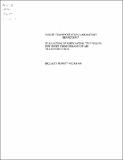Evaluation of forecasting techniques for short-term demand of air transportation
Author(s)
Wickham, Richard Robert
DownloadFTL_R_1995_07.pdf (9.483Mb)
Other Contributors
Massachusetts Institute of Technology. Flight Transportation Laboratory
Metadata
Show full item recordAbstract
Forecasting is arguably the most critical component of airline management. Essentially, airlines forecast demand to plan the supply of services to respond to that demand. Forecasts of short-term demand facilitate tactical decisions such as pricing and seat inventory control-the allocation of seats among the various booking classes. In this study, an evaluation was conducted of the relative performance of selected forecasting techniques used to predict short-term demand for air transportation. Short-term in this context is defined as intervals less than eight weeks prior to the date of departure. The selected techniques were representative of current practices in the airline industry including simple time series, linear regression, and booking pickup models. Two types of pickup models were analyzed: the classical model and an advanced model. The set of models was subjected to the same short-term forecasting environment where the historical data was restricted to ten weekly departures and the forecast horizon limited to seven weeks in the future. Eight scenarios were examined to study the effects of varying the size of the historical data set as well as the length of the forecast horizon. Performance was determined on the basis of the relative accuracy of the forecasts measured through the use of selected metrics. It will be shown that the booking pickup models consistently outperformed the time series and regression models and the advanced pickup model produced the best results. Furthermore, it was discovered that increasing the size of the historical data set beyond seven weekly departures did not have a significant impact on the performance of the various models and in most cases the performance of the models deteriorated as the size of the historical data set was increased.
Description
May 1995 Includes bibliographical references (p. [121]-124)
Date issued
1995Publisher
[Cambridge, Mass. : Massachusetts Institute of Technology, Dept. of Aeronautics & Astronautics], Flight Transportation Laboratory, [1995]
Other identifiers
46666624
Series/Report no.
FTL report (Massachusetts Institute of Technology. Flight Transportation Laboratory) ; R95-7
Keywords
Aeronautics, Commercial, Air travel, Airlines, Revenue management, Passenger traffic, Reservation systems